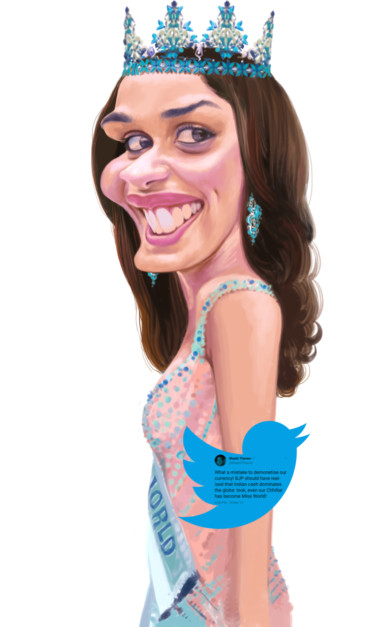I remember it so clearly. That night in 1994 when we huddled around the TV set in my boarding school, watching a live broadcast of the Miss World pageant from Sun City, South Africa. There was a lot of buzz around Aishwarya Rai, who had come second at the Miss India contest earlier that year, beaten by Sushmita Sen in a tie-breaker round. Sen had already gone on to win the Miss Universe pageant, and the pressure was on Rai, whose beauty, many said, was incomparable. She, of course, won.
But the 1990s were such a different era. Our entertainment was via a single state-owned channel, there were no mobile phones, no internet and the newly-liberalised Indian economy was just beginning to open up to a whole new world.
It’s a very different world into which Manushi Chhillar, the newly-crowned Miss World, steps into. No wonder the first mini-controversy (even if you could call it that) that she was dragged into was via Twitter. (Spoiler alert: She put it out with a lot of grace).
As soon as news broke of her Miss World win, the usually articulate Indian politician Shashi Tharoor took the opportunity to take a swipe at the government’s currency demonetisation last year, courtesy Chhillar.
“What a mistake to demonetise our currency! BJP should have realised that Indian cash dominates the globe: look, even our Chhillar has become Miss World!,” Tharoor tweeted, playing on the Hindi word ‘chillar’ meaning ‘loose change’. This of course set off a barrage of insults, mostly aimed at Tharoor.
Chhillar, compelled to respond, finally tweeted: “A girl who has just won the World isn’t going to be upset over a tongue-in-cheek remark. ‘Chillar’ talk is just small change — let’s not forget the ‘chill’ within Chhillar,” she posted, tagging Tharoor, who then apologised and called her a “class act”.
Only 20, this medical student from Haryana joins an impressive group of women who have won Miss World titles for India. Reita Faria, who won the crown in 1966 went on to become a doctor, Rai (now Rai-Bachchan) is still one of the most influential celebrities in the country, Diana Hayden (1997) is an actor and published author, Yukta Mookhey (1999) is an actor and Priyanka Chopra, who won in 2000, is now the biggest international star India has ever produced.
Irrespective of where you stand in the debate about whether or not beauty pageants are still relevant today, there’s no denying that winning a Miss World title still proves an amazing platform for many women.
The formats of beauty pageants have also evolved over the years. The Miss World organisation, for instance, has since 2014 done away with the cringeworthy swimsuit round and stressed on its Beauty With a Purpose segment. It’s inspired by a non-profit of the same name the organisation funds, which supports humanitarian projects around the world. Since 2001, each contestant is required to undertake a project in their home countries, which is then evaluated during the pageant, which then accounts for 50 per cent of points in the final leaderboard.
Chhillar’s menstrual hygiene project was one of five to win the Beauty With a Purpose segment, fast-tracking her way to the top. Called Project Shakti (Power), she has travelled across her country as Miss India, spreading awareness and speaking to hundreds of women that shockingly still have little knowledge about menstruation. According to Unicef, more than 75 per cent of women still do not know what material to use when menstruating. This ignorance, it says, leads to diseases and infection.
“The poor menstrual management in our country and across the world has always bothered me as a person,” Chhillar said before she travelled to China for the pageant. “That’s one cause that I will take forward with me.” An urgent and worthwhile cause that clearly caught the attention of the judges.
The young beauty queen’s zeal probably comes from her parents, who are both doctors: Her father, Mitra Basu Chhillar, is a scientist at India’s Defence Research and Development Organisation; her mother, Neelam Chhillar, is the head of the department of Neuro-chemistry at the Institute of Human Behaviour and Allied Sciences. Although she’s taken a year’s break from medical school — with the blessing of her parents — she says she wants to eventually finish college and become a cardiologist. Being a beauty queen, she says, was a childhood dream and because her parents always taught her to follow her passion, she decided to give it a shot.
Faria, the first Indian woman to win the Miss World crown in 1966, was her inspiration, she says.
“She is not only the first Indian to represent the country in Miss World, but also won it. The best part about her is that she followed her passion. The moment she was done with her duties as Miss World, she went into education as she was passionate about becoming a doctor,” she said earlier.
The fact that her parents are a big influence in her life eventually clinched her the crown. When asked which profession deserved the highest pay and why, Chhillar didn’t need much time to ponder.
“I think a mother deserves the highest respect and when you talk about salary it’s not always about cash, but I feel it’s the love and respect that you give to someone,” she said. “My mother has always been the biggest inspiration in my life. All mothers sacrifice so much for their kids. So, I think it is the job of a mother that deserves the highest salary.”
That on a platform that celebrates women, is what you call a winning answer.











